Global Citizenship vs. National Identity: A Detailed Essay Analysis
VerifiedAdded on 2021/02/20
|8
|2389
|99
Essay
AI Summary
This essay critically examines the ongoing debate regarding whether global citizenship should supplant national identity. It begins by defining global citizenship as a consciousness of the world and an individual's place within it, emphasizing participation in a global community focused on fairness, equality, and sustainability. The essay contrasts this with national identity, which encompasses the values, norms, and beliefs associated with one's country of origin. The main body of the essay explores various initiatives and perspectives, including the UN's Global Education First Initiative and the European Year of Development, which implicitly reference global citizenship. It discusses the historical context of global citizenship, tracing it back to Diogenes of Sinope, and examines how globalization has reshaped the concept of citizenship. The essay further analyzes the arguments for and against global citizenship, addressing the potential threats to national identity and the changing nature of civic engagement in a globalized world. It also examines the practical implications of global citizenship, including its limitations in terms of political rights and its potential to create a divide between cosmopolitans and nationalists. The essay concludes by arguing that national identity remains crucial for large-scale problem-solving and that global citizenship should not replace national identity, as it is fundamental to an individual's personality and ideology.
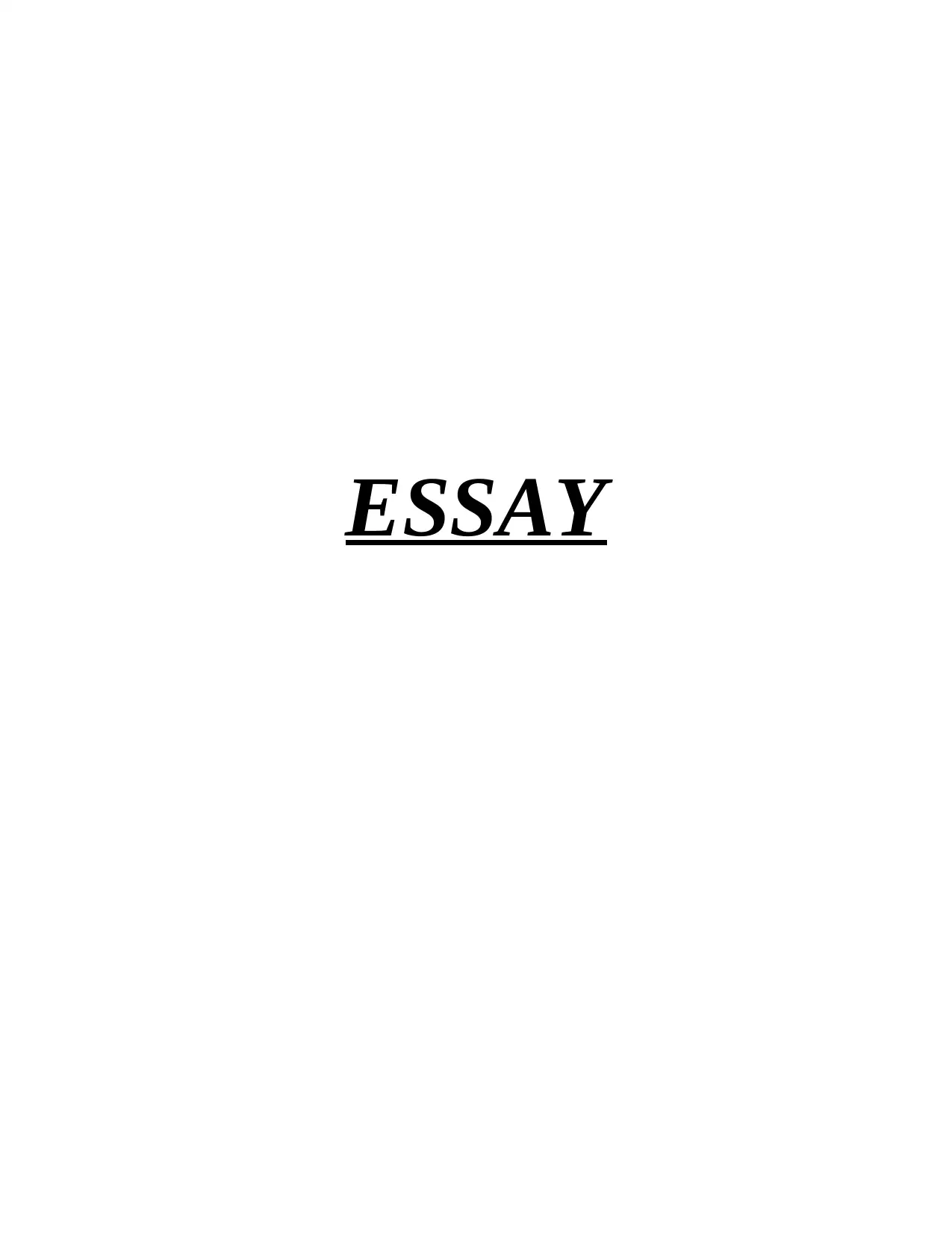
ESSAY
Paraphrase This Document
Need a fresh take? Get an instant paraphrase of this document with our AI Paraphraser

Table of Contents
1. Should Global Citizenship replace national identity? Discuss....................................................3
INTRODUCTION...........................................................................................................................3
MAIN BODY...................................................................................................................................3
CONCLUSION................................................................................................................................7
REFERENCES................................................................................................................................8
1. Should Global Citizenship replace national identity? Discuss....................................................3
INTRODUCTION...........................................................................................................................3
MAIN BODY...................................................................................................................................3
CONCLUSION................................................................................................................................7
REFERENCES................................................................................................................................8
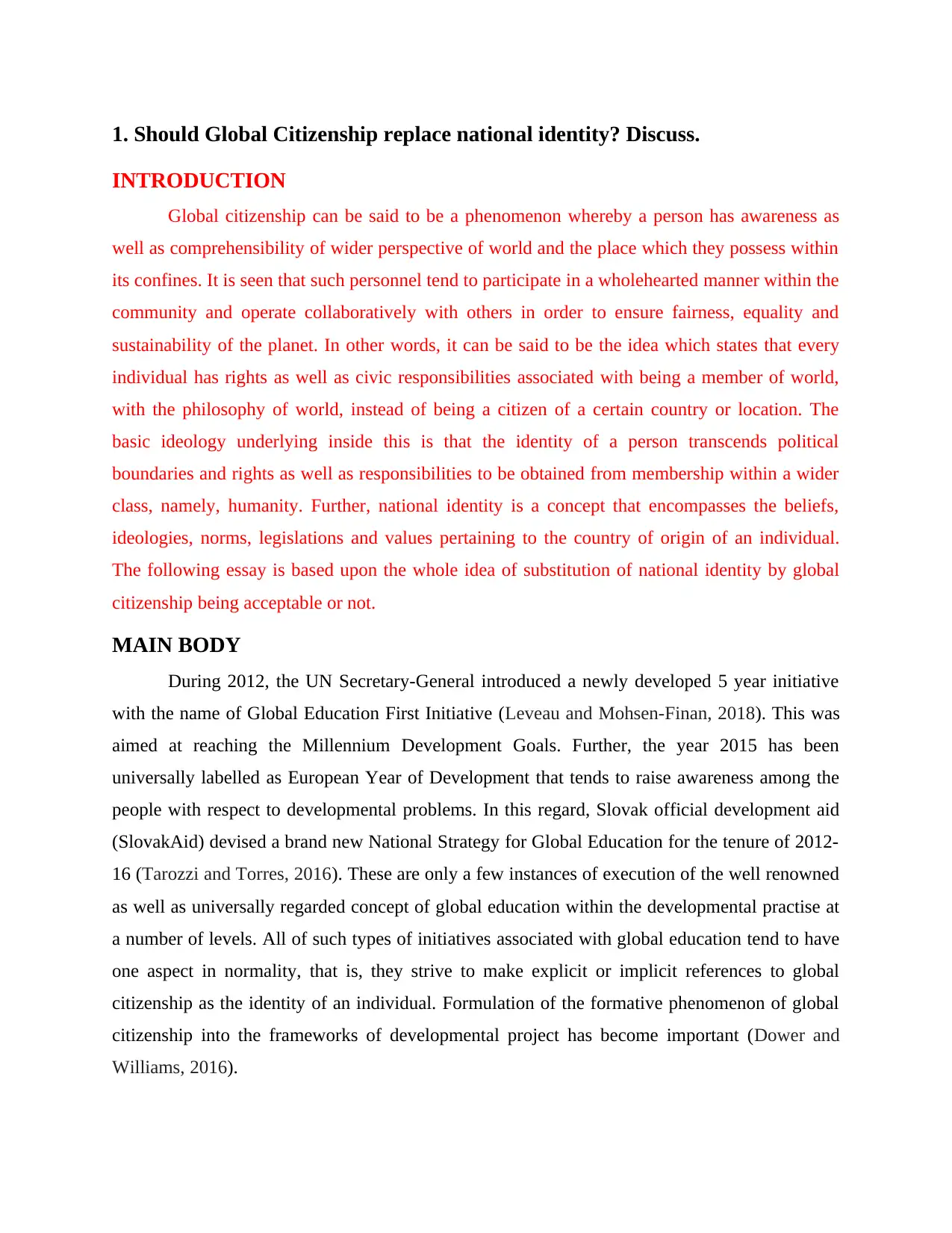
1. Should Global Citizenship replace national identity? Discuss.
INTRODUCTION
Global citizenship can be said to be a phenomenon whereby a person has awareness as
well as comprehensibility of wider perspective of world and the place which they possess within
its confines. It is seen that such personnel tend to participate in a wholehearted manner within the
community and operate collaboratively with others in order to ensure fairness, equality and
sustainability of the planet. In other words, it can be said to be the idea which states that every
individual has rights as well as civic responsibilities associated with being a member of world,
with the philosophy of world, instead of being a citizen of a certain country or location. The
basic ideology underlying inside this is that the identity of a person transcends political
boundaries and rights as well as responsibilities to be obtained from membership within a wider
class, namely, humanity. Further, national identity is a concept that encompasses the beliefs,
ideologies, norms, legislations and values pertaining to the country of origin of an individual.
The following essay is based upon the whole idea of substitution of national identity by global
citizenship being acceptable or not.
MAIN BODY
During 2012, the UN Secretary-General introduced a newly developed 5 year initiative
with the name of Global Education First Initiative (Leveau and Mohsen-Finan, 2018). This was
aimed at reaching the Millennium Development Goals. Further, the year 2015 has been
universally labelled as European Year of Development that tends to raise awareness among the
people with respect to developmental problems. In this regard, Slovak official development aid
(SlovakAid) devised a brand new National Strategy for Global Education for the tenure of 2012-
16 (Tarozzi and Torres, 2016). These are only a few instances of execution of the well renowned
as well as universally regarded concept of global education within the developmental practise at
a number of levels. All of such types of initiatives associated with global education tend to have
one aspect in normality, that is, they strive to make explicit or implicit references to global
citizenship as the identity of an individual. Formulation of the formative phenomenon of global
citizenship into the frameworks of developmental project has become important (Dower and
Williams, 2016).
INTRODUCTION
Global citizenship can be said to be a phenomenon whereby a person has awareness as
well as comprehensibility of wider perspective of world and the place which they possess within
its confines. It is seen that such personnel tend to participate in a wholehearted manner within the
community and operate collaboratively with others in order to ensure fairness, equality and
sustainability of the planet. In other words, it can be said to be the idea which states that every
individual has rights as well as civic responsibilities associated with being a member of world,
with the philosophy of world, instead of being a citizen of a certain country or location. The
basic ideology underlying inside this is that the identity of a person transcends political
boundaries and rights as well as responsibilities to be obtained from membership within a wider
class, namely, humanity. Further, national identity is a concept that encompasses the beliefs,
ideologies, norms, legislations and values pertaining to the country of origin of an individual.
The following essay is based upon the whole idea of substitution of national identity by global
citizenship being acceptable or not.
MAIN BODY
During 2012, the UN Secretary-General introduced a newly developed 5 year initiative
with the name of Global Education First Initiative (Leveau and Mohsen-Finan, 2018). This was
aimed at reaching the Millennium Development Goals. Further, the year 2015 has been
universally labelled as European Year of Development that tends to raise awareness among the
people with respect to developmental problems. In this regard, Slovak official development aid
(SlovakAid) devised a brand new National Strategy for Global Education for the tenure of 2012-
16 (Tarozzi and Torres, 2016). These are only a few instances of execution of the well renowned
as well as universally regarded concept of global education within the developmental practise at
a number of levels. All of such types of initiatives associated with global education tend to have
one aspect in normality, that is, they strive to make explicit or implicit references to global
citizenship as the identity of an individual. Formulation of the formative phenomenon of global
citizenship into the frameworks of developmental project has become important (Dower and
Williams, 2016).
⊘ This is a preview!⊘
Do you want full access?
Subscribe today to unlock all pages.

Trusted by 1+ million students worldwide
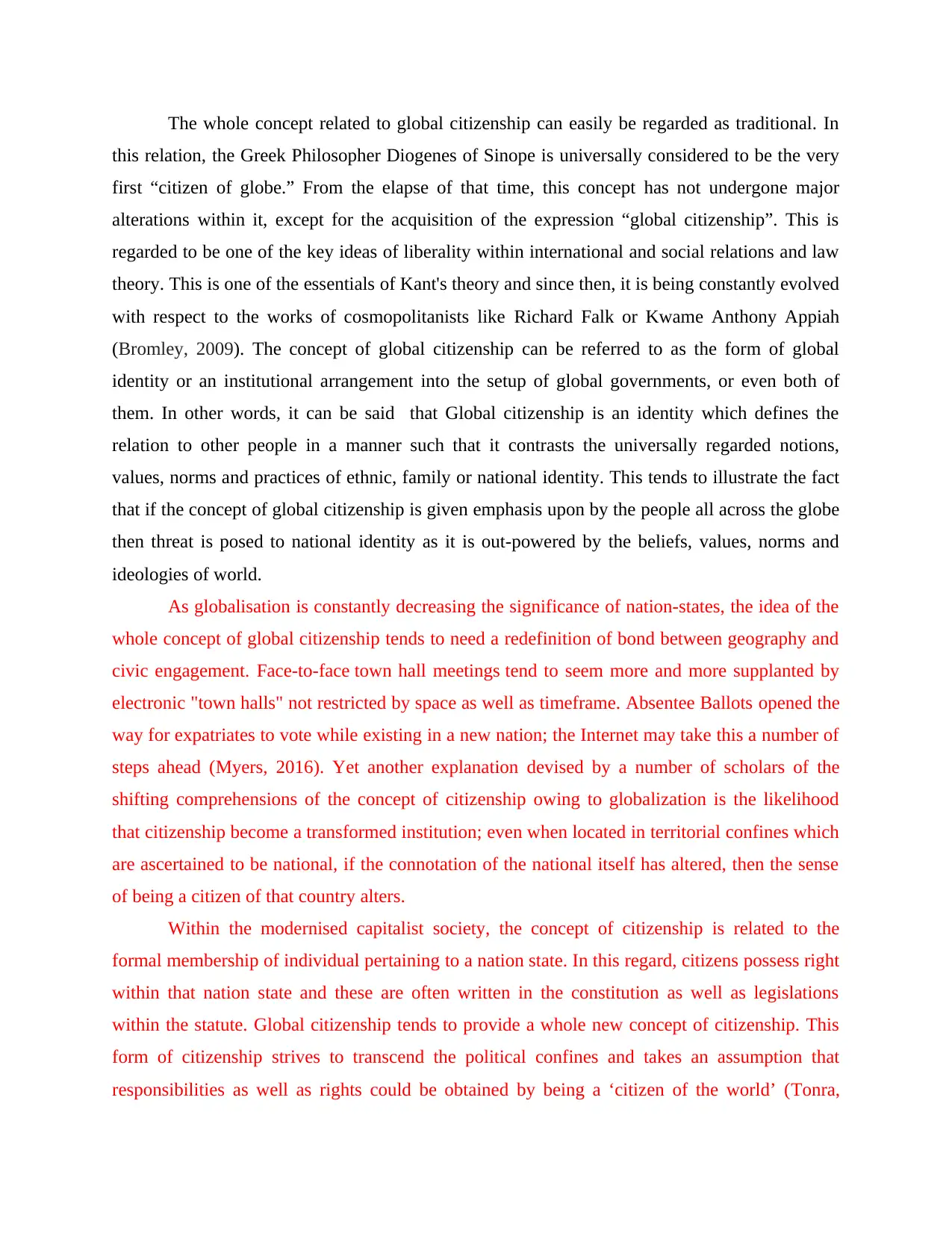
The whole concept related to global citizenship can easily be regarded as traditional. In
this relation, the Greek Philosopher Diogenes of Sinope is universally considered to be the very
first “citizen of globe.” From the elapse of that time, this concept has not undergone major
alterations within it, except for the acquisition of the expression “global citizenship”. This is
regarded to be one of the key ideas of liberality within international and social relations and law
theory. This is one of the essentials of Kant's theory and since then, it is being constantly evolved
with respect to the works of cosmopolitanists like Richard Falk or Kwame Anthony Appiah
(Bromley, 2009). The concept of global citizenship can be referred to as the form of global
identity or an institutional arrangement into the setup of global governments, or even both of
them. In other words, it can be said that Global citizenship is an identity which defines the
relation to other people in a manner such that it contrasts the universally regarded notions,
values, norms and practices of ethnic, family or national identity. This tends to illustrate the fact
that if the concept of global citizenship is given emphasis upon by the people all across the globe
then threat is posed to national identity as it is out-powered by the beliefs, values, norms and
ideologies of world.
As globalisation is constantly decreasing the significance of nation-states, the idea of the
whole concept of global citizenship tends to need a redefinition of bond between geography and
civic engagement. Face-to-face town hall meetings tend to seem more and more supplanted by
electronic "town halls" not restricted by space as well as timeframe. Absentee Ballots opened the
way for expatriates to vote while existing in a new nation; the Internet may take this a number of
steps ahead (Myers, 2016). Yet another explanation devised by a number of scholars of the
shifting comprehensions of the concept of citizenship owing to globalization is the likelihood
that citizenship become a transformed institution; even when located in territorial confines which
are ascertained to be national, if the connotation of the national itself has altered, then the sense
of being a citizen of that country alters.
Within the modernised capitalist society, the concept of citizenship is related to the
formal membership of individual pertaining to a nation state. In this regard, citizens possess right
within that nation state and these are often written in the constitution as well as legislations
within the statute. Global citizenship tends to provide a whole new concept of citizenship. This
form of citizenship strives to transcend the political confines and takes an assumption that
responsibilities as well as rights could be obtained by being a ‘citizen of the world’ (Tonra,
this relation, the Greek Philosopher Diogenes of Sinope is universally considered to be the very
first “citizen of globe.” From the elapse of that time, this concept has not undergone major
alterations within it, except for the acquisition of the expression “global citizenship”. This is
regarded to be one of the key ideas of liberality within international and social relations and law
theory. This is one of the essentials of Kant's theory and since then, it is being constantly evolved
with respect to the works of cosmopolitanists like Richard Falk or Kwame Anthony Appiah
(Bromley, 2009). The concept of global citizenship can be referred to as the form of global
identity or an institutional arrangement into the setup of global governments, or even both of
them. In other words, it can be said that Global citizenship is an identity which defines the
relation to other people in a manner such that it contrasts the universally regarded notions,
values, norms and practices of ethnic, family or national identity. This tends to illustrate the fact
that if the concept of global citizenship is given emphasis upon by the people all across the globe
then threat is posed to national identity as it is out-powered by the beliefs, values, norms and
ideologies of world.
As globalisation is constantly decreasing the significance of nation-states, the idea of the
whole concept of global citizenship tends to need a redefinition of bond between geography and
civic engagement. Face-to-face town hall meetings tend to seem more and more supplanted by
electronic "town halls" not restricted by space as well as timeframe. Absentee Ballots opened the
way for expatriates to vote while existing in a new nation; the Internet may take this a number of
steps ahead (Myers, 2016). Yet another explanation devised by a number of scholars of the
shifting comprehensions of the concept of citizenship owing to globalization is the likelihood
that citizenship become a transformed institution; even when located in territorial confines which
are ascertained to be national, if the connotation of the national itself has altered, then the sense
of being a citizen of that country alters.
Within the modernised capitalist society, the concept of citizenship is related to the
formal membership of individual pertaining to a nation state. In this regard, citizens possess right
within that nation state and these are often written in the constitution as well as legislations
within the statute. Global citizenship tends to provide a whole new concept of citizenship. This
form of citizenship strives to transcend the political confines and takes an assumption that
responsibilities as well as rights could be obtained by being a ‘citizen of the world’ (Tonra,
Paraphrase This Document
Need a fresh take? Get an instant paraphrase of this document with our AI Paraphraser
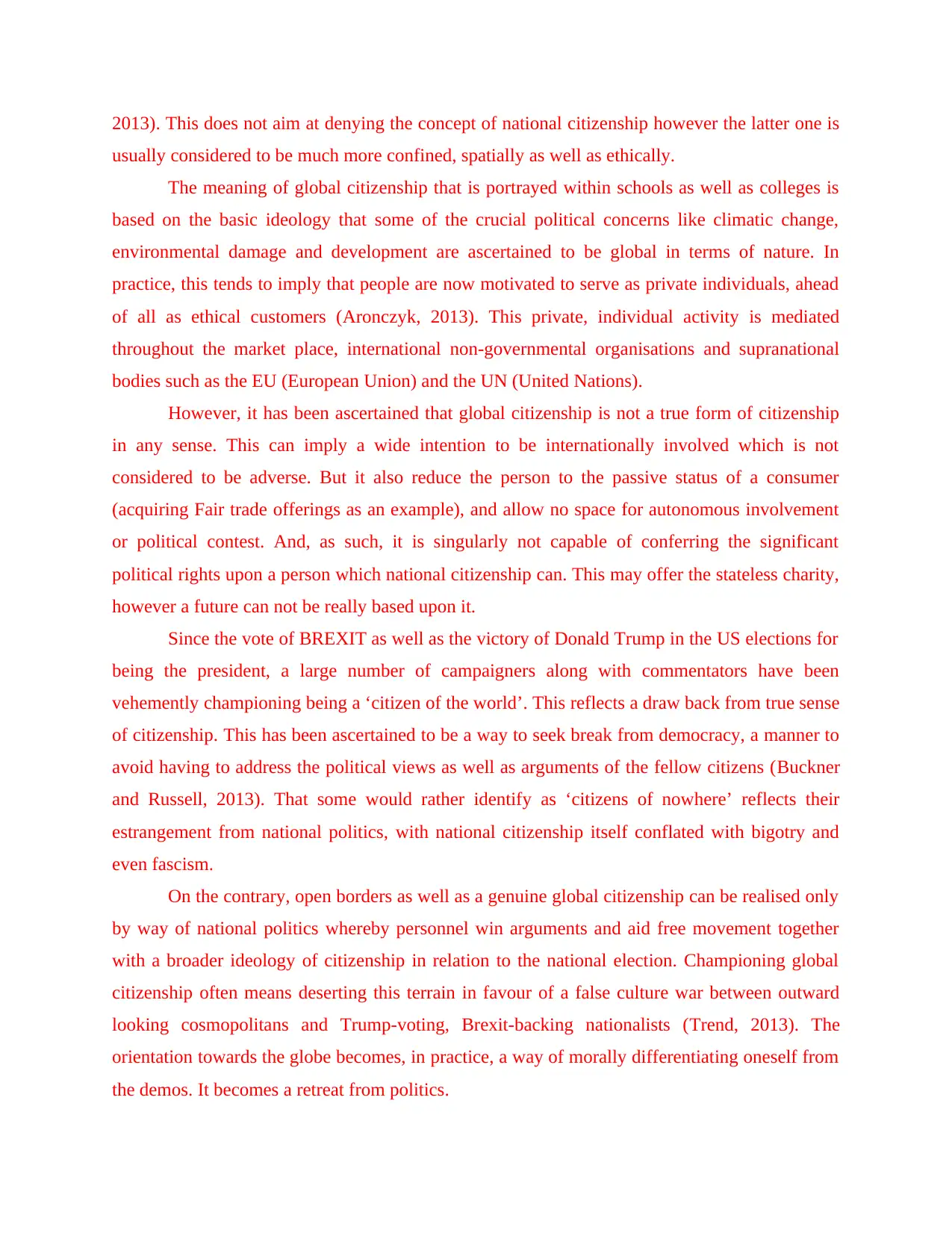
2013). This does not aim at denying the concept of national citizenship however the latter one is
usually considered to be much more confined, spatially as well as ethically.
The meaning of global citizenship that is portrayed within schools as well as colleges is
based on the basic ideology that some of the crucial political concerns like climatic change,
environmental damage and development are ascertained to be global in terms of nature. In
practice, this tends to imply that people are now motivated to serve as private individuals, ahead
of all as ethical customers (Aronczyk, 2013). This private, individual activity is mediated
throughout the market place, international non-governmental organisations and supranational
bodies such as the EU (European Union) and the UN (United Nations).
However, it has been ascertained that global citizenship is not a true form of citizenship
in any sense. This can imply a wide intention to be internationally involved which is not
considered to be adverse. But it also reduce the person to the passive status of a consumer
(acquiring Fair trade offerings as an example), and allow no space for autonomous involvement
or political contest. And, as such, it is singularly not capable of conferring the significant
political rights upon a person which national citizenship can. This may offer the stateless charity,
however a future can not be really based upon it.
Since the vote of BREXIT as well as the victory of Donald Trump in the US elections for
being the president, a large number of campaigners along with commentators have been
vehemently championing being a ‘citizen of the world’. This reflects a draw back from true sense
of citizenship. This has been ascertained to be a way to seek break from democracy, a manner to
avoid having to address the political views as well as arguments of the fellow citizens (Buckner
and Russell, 2013). That some would rather identify as ‘citizens of nowhere’ reflects their
estrangement from national politics, with national citizenship itself conflated with bigotry and
even fascism.
On the contrary, open borders as well as a genuine global citizenship can be realised only
by way of national politics whereby personnel win arguments and aid free movement together
with a broader ideology of citizenship in relation to the national election. Championing global
citizenship often means deserting this terrain in favour of a false culture war between outward
looking cosmopolitans and Trump-voting, Brexit-backing nationalists (Trend, 2013). The
orientation towards the globe becomes, in practice, a way of morally differentiating oneself from
the demos. It becomes a retreat from politics.
usually considered to be much more confined, spatially as well as ethically.
The meaning of global citizenship that is portrayed within schools as well as colleges is
based on the basic ideology that some of the crucial political concerns like climatic change,
environmental damage and development are ascertained to be global in terms of nature. In
practice, this tends to imply that people are now motivated to serve as private individuals, ahead
of all as ethical customers (Aronczyk, 2013). This private, individual activity is mediated
throughout the market place, international non-governmental organisations and supranational
bodies such as the EU (European Union) and the UN (United Nations).
However, it has been ascertained that global citizenship is not a true form of citizenship
in any sense. This can imply a wide intention to be internationally involved which is not
considered to be adverse. But it also reduce the person to the passive status of a consumer
(acquiring Fair trade offerings as an example), and allow no space for autonomous involvement
or political contest. And, as such, it is singularly not capable of conferring the significant
political rights upon a person which national citizenship can. This may offer the stateless charity,
however a future can not be really based upon it.
Since the vote of BREXIT as well as the victory of Donald Trump in the US elections for
being the president, a large number of campaigners along with commentators have been
vehemently championing being a ‘citizen of the world’. This reflects a draw back from true sense
of citizenship. This has been ascertained to be a way to seek break from democracy, a manner to
avoid having to address the political views as well as arguments of the fellow citizens (Buckner
and Russell, 2013). That some would rather identify as ‘citizens of nowhere’ reflects their
estrangement from national politics, with national citizenship itself conflated with bigotry and
even fascism.
On the contrary, open borders as well as a genuine global citizenship can be realised only
by way of national politics whereby personnel win arguments and aid free movement together
with a broader ideology of citizenship in relation to the national election. Championing global
citizenship often means deserting this terrain in favour of a false culture war between outward
looking cosmopolitans and Trump-voting, Brexit-backing nationalists (Trend, 2013). The
orientation towards the globe becomes, in practice, a way of morally differentiating oneself from
the demos. It becomes a retreat from politics.
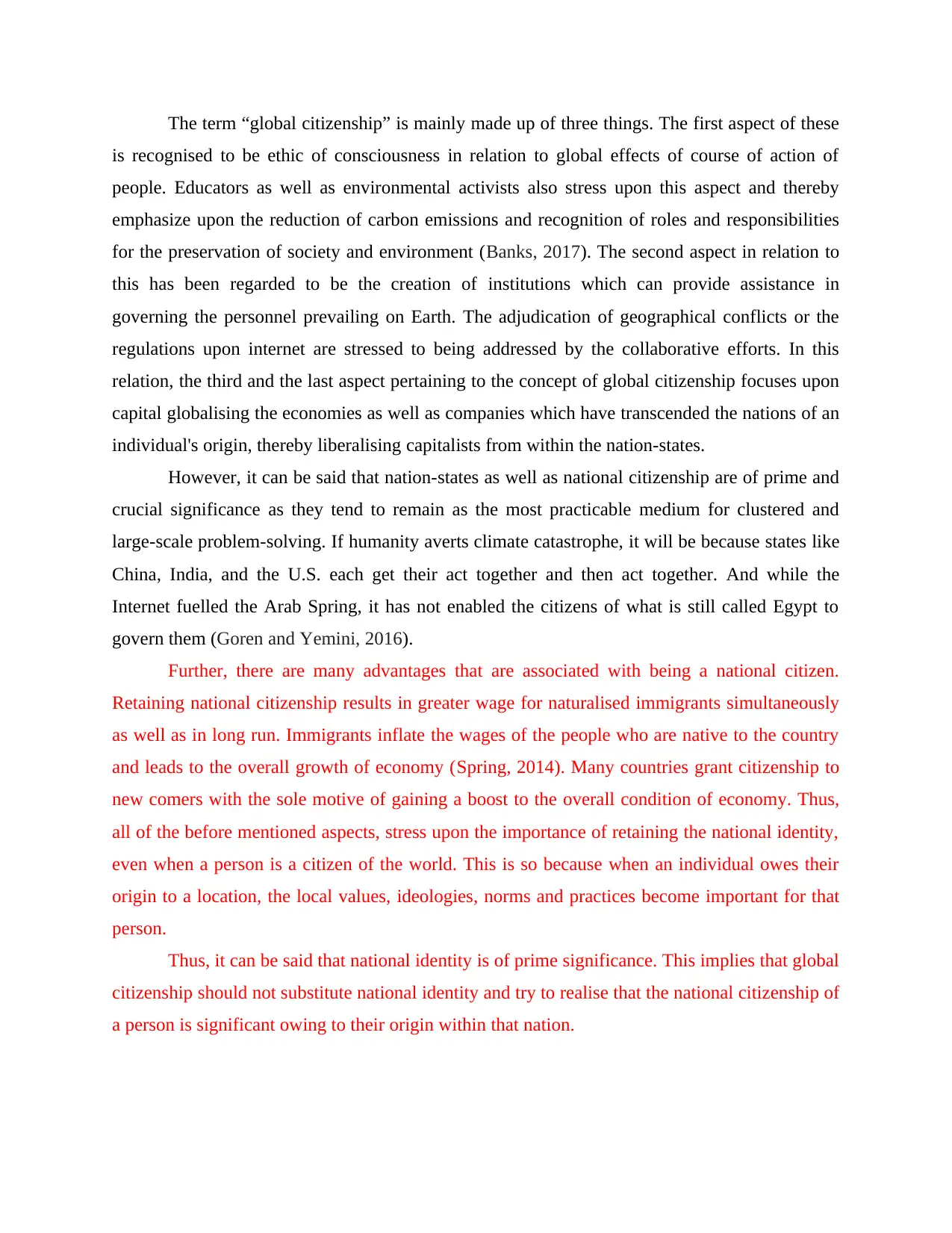
The term “global citizenship” is mainly made up of three things. The first aspect of these
is recognised to be ethic of consciousness in relation to global effects of course of action of
people. Educators as well as environmental activists also stress upon this aspect and thereby
emphasize upon the reduction of carbon emissions and recognition of roles and responsibilities
for the preservation of society and environment (Banks, 2017). The second aspect in relation to
this has been regarded to be the creation of institutions which can provide assistance in
governing the personnel prevailing on Earth. The adjudication of geographical conflicts or the
regulations upon internet are stressed to being addressed by the collaborative efforts. In this
relation, the third and the last aspect pertaining to the concept of global citizenship focuses upon
capital globalising the economies as well as companies which have transcended the nations of an
individual's origin, thereby liberalising capitalists from within the nation-states.
However, it can be said that nation-states as well as national citizenship are of prime and
crucial significance as they tend to remain as the most practicable medium for clustered and
large-scale problem-solving. If humanity averts climate catastrophe, it will be because states like
China, India, and the U.S. each get their act together and then act together. And while the
Internet fuelled the Arab Spring, it has not enabled the citizens of what is still called Egypt to
govern them (Goren and Yemini, 2016).
Further, there are many advantages that are associated with being a national citizen.
Retaining national citizenship results in greater wage for naturalised immigrants simultaneously
as well as in long run. Immigrants inflate the wages of the people who are native to the country
and leads to the overall growth of economy (Spring, 2014). Many countries grant citizenship to
new comers with the sole motive of gaining a boost to the overall condition of economy. Thus,
all of the before mentioned aspects, stress upon the importance of retaining the national identity,
even when a person is a citizen of the world. This is so because when an individual owes their
origin to a location, the local values, ideologies, norms and practices become important for that
person.
Thus, it can be said that national identity is of prime significance. This implies that global
citizenship should not substitute national identity and try to realise that the national citizenship of
a person is significant owing to their origin within that nation.
is recognised to be ethic of consciousness in relation to global effects of course of action of
people. Educators as well as environmental activists also stress upon this aspect and thereby
emphasize upon the reduction of carbon emissions and recognition of roles and responsibilities
for the preservation of society and environment (Banks, 2017). The second aspect in relation to
this has been regarded to be the creation of institutions which can provide assistance in
governing the personnel prevailing on Earth. The adjudication of geographical conflicts or the
regulations upon internet are stressed to being addressed by the collaborative efforts. In this
relation, the third and the last aspect pertaining to the concept of global citizenship focuses upon
capital globalising the economies as well as companies which have transcended the nations of an
individual's origin, thereby liberalising capitalists from within the nation-states.
However, it can be said that nation-states as well as national citizenship are of prime and
crucial significance as they tend to remain as the most practicable medium for clustered and
large-scale problem-solving. If humanity averts climate catastrophe, it will be because states like
China, India, and the U.S. each get their act together and then act together. And while the
Internet fuelled the Arab Spring, it has not enabled the citizens of what is still called Egypt to
govern them (Goren and Yemini, 2016).
Further, there are many advantages that are associated with being a national citizen.
Retaining national citizenship results in greater wage for naturalised immigrants simultaneously
as well as in long run. Immigrants inflate the wages of the people who are native to the country
and leads to the overall growth of economy (Spring, 2014). Many countries grant citizenship to
new comers with the sole motive of gaining a boost to the overall condition of economy. Thus,
all of the before mentioned aspects, stress upon the importance of retaining the national identity,
even when a person is a citizen of the world. This is so because when an individual owes their
origin to a location, the local values, ideologies, norms and practices become important for that
person.
Thus, it can be said that national identity is of prime significance. This implies that global
citizenship should not substitute national identity and try to realise that the national citizenship of
a person is significant owing to their origin within that nation.
⊘ This is a preview!⊘
Do you want full access?
Subscribe today to unlock all pages.

Trusted by 1+ million students worldwide
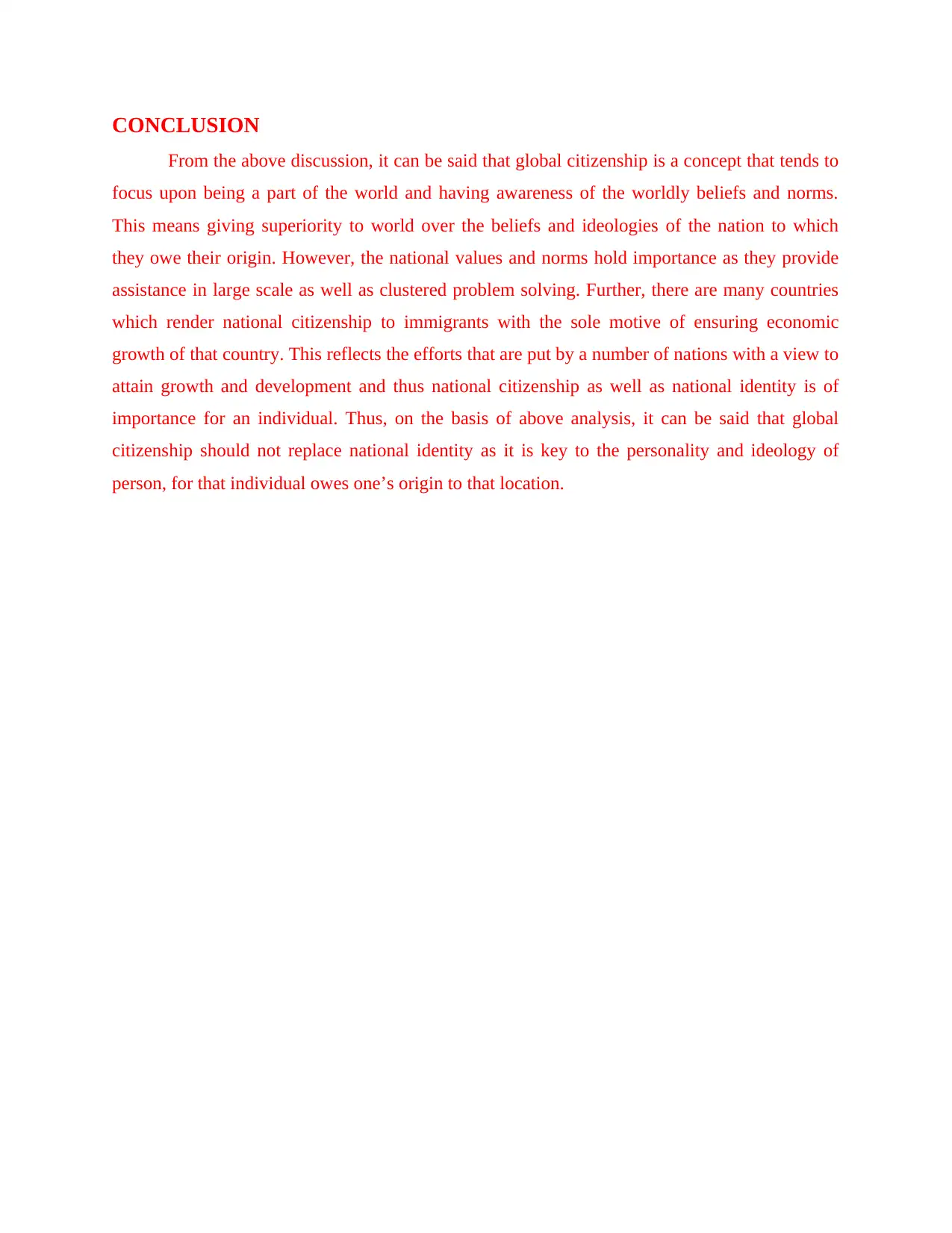
CONCLUSION
From the above discussion, it can be said that global citizenship is a concept that tends to
focus upon being a part of the world and having awareness of the worldly beliefs and norms.
This means giving superiority to world over the beliefs and ideologies of the nation to which
they owe their origin. However, the national values and norms hold importance as they provide
assistance in large scale as well as clustered problem solving. Further, there are many countries
which render national citizenship to immigrants with the sole motive of ensuring economic
growth of that country. This reflects the efforts that are put by a number of nations with a view to
attain growth and development and thus national citizenship as well as national identity is of
importance for an individual. Thus, on the basis of above analysis, it can be said that global
citizenship should not replace national identity as it is key to the personality and ideology of
person, for that individual owes one’s origin to that location.
From the above discussion, it can be said that global citizenship is a concept that tends to
focus upon being a part of the world and having awareness of the worldly beliefs and norms.
This means giving superiority to world over the beliefs and ideologies of the nation to which
they owe their origin. However, the national values and norms hold importance as they provide
assistance in large scale as well as clustered problem solving. Further, there are many countries
which render national citizenship to immigrants with the sole motive of ensuring economic
growth of that country. This reflects the efforts that are put by a number of nations with a view to
attain growth and development and thus national citizenship as well as national identity is of
importance for an individual. Thus, on the basis of above analysis, it can be said that global
citizenship should not replace national identity as it is key to the personality and ideology of
person, for that individual owes one’s origin to that location.
Paraphrase This Document
Need a fresh take? Get an instant paraphrase of this document with our AI Paraphraser
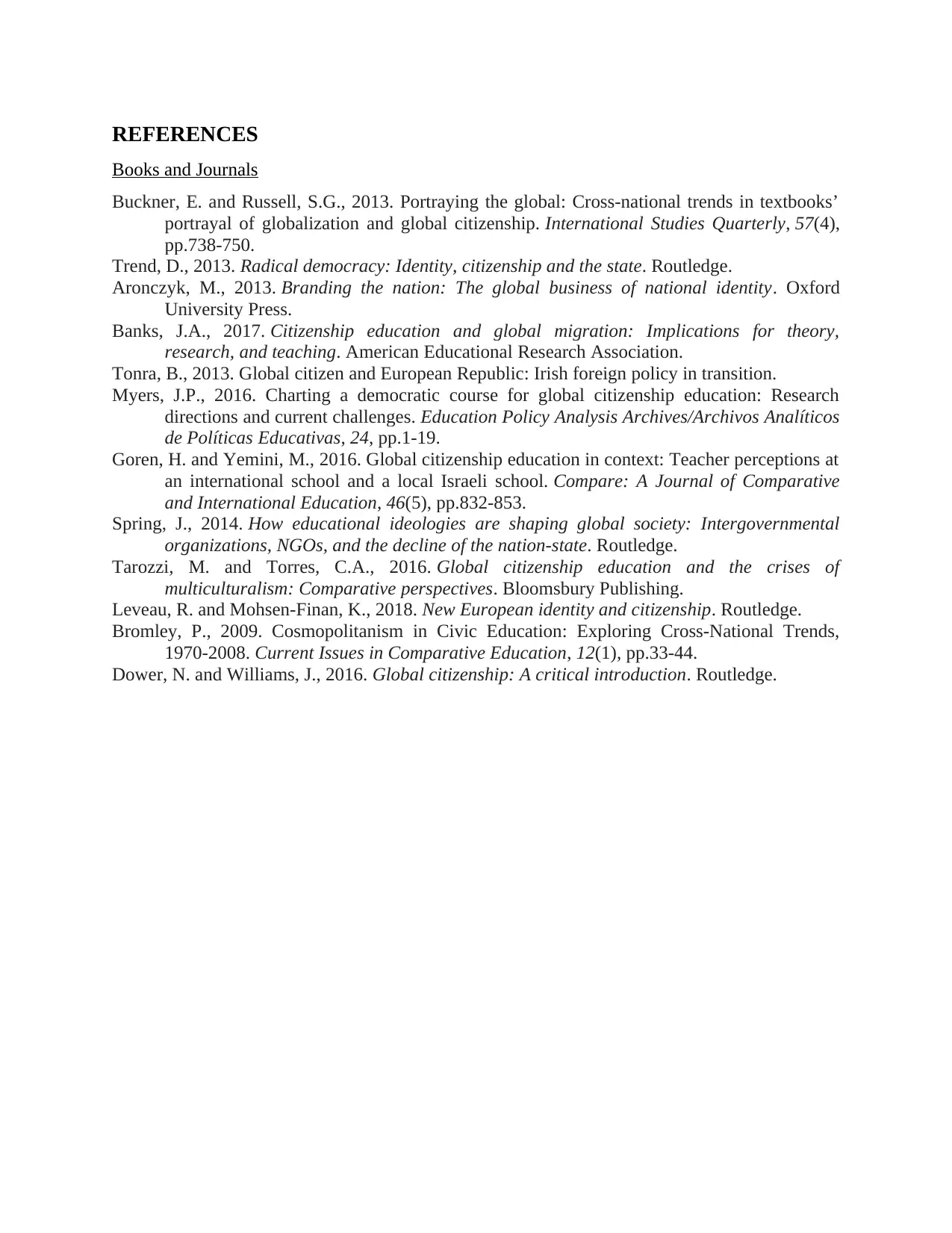
REFERENCES
Books and Journals
Buckner, E. and Russell, S.G., 2013. Portraying the global: Cross-national trends in textbooks’
portrayal of globalization and global citizenship. International Studies Quarterly, 57(4),
pp.738-750.
Trend, D., 2013. Radical democracy: Identity, citizenship and the state. Routledge.
Aronczyk, M., 2013. Branding the nation: The global business of national identity. Oxford
University Press.
Banks, J.A., 2017. Citizenship education and global migration: Implications for theory,
research, and teaching. American Educational Research Association.
Tonra, B., 2013. Global citizen and European Republic: Irish foreign policy in transition.
Myers, J.P., 2016. Charting a democratic course for global citizenship education: Research
directions and current challenges. Education Policy Analysis Archives/Archivos Analíticos
de Políticas Educativas, 24, pp.1-19.
Goren, H. and Yemini, M., 2016. Global citizenship education in context: Teacher perceptions at
an international school and a local Israeli school. Compare: A Journal of Comparative
and International Education, 46(5), pp.832-853.
Spring, J., 2014. How educational ideologies are shaping global society: Intergovernmental
organizations, NGOs, and the decline of the nation-state. Routledge.
Tarozzi, M. and Torres, C.A., 2016. Global citizenship education and the crises of
multiculturalism: Comparative perspectives. Bloomsbury Publishing.
Leveau, R. and Mohsen-Finan, K., 2018. New European identity and citizenship. Routledge.
Bromley, P., 2009. Cosmopolitanism in Civic Education: Exploring Cross-National Trends,
1970-2008. Current Issues in Comparative Education, 12(1), pp.33-44.
Dower, N. and Williams, J., 2016. Global citizenship: A critical introduction. Routledge.
Books and Journals
Buckner, E. and Russell, S.G., 2013. Portraying the global: Cross-national trends in textbooks’
portrayal of globalization and global citizenship. International Studies Quarterly, 57(4),
pp.738-750.
Trend, D., 2013. Radical democracy: Identity, citizenship and the state. Routledge.
Aronczyk, M., 2013. Branding the nation: The global business of national identity. Oxford
University Press.
Banks, J.A., 2017. Citizenship education and global migration: Implications for theory,
research, and teaching. American Educational Research Association.
Tonra, B., 2013. Global citizen and European Republic: Irish foreign policy in transition.
Myers, J.P., 2016. Charting a democratic course for global citizenship education: Research
directions and current challenges. Education Policy Analysis Archives/Archivos Analíticos
de Políticas Educativas, 24, pp.1-19.
Goren, H. and Yemini, M., 2016. Global citizenship education in context: Teacher perceptions at
an international school and a local Israeli school. Compare: A Journal of Comparative
and International Education, 46(5), pp.832-853.
Spring, J., 2014. How educational ideologies are shaping global society: Intergovernmental
organizations, NGOs, and the decline of the nation-state. Routledge.
Tarozzi, M. and Torres, C.A., 2016. Global citizenship education and the crises of
multiculturalism: Comparative perspectives. Bloomsbury Publishing.
Leveau, R. and Mohsen-Finan, K., 2018. New European identity and citizenship. Routledge.
Bromley, P., 2009. Cosmopolitanism in Civic Education: Exploring Cross-National Trends,
1970-2008. Current Issues in Comparative Education, 12(1), pp.33-44.
Dower, N. and Williams, J., 2016. Global citizenship: A critical introduction. Routledge.
1 out of 8
Related Documents
Your All-in-One AI-Powered Toolkit for Academic Success.
+13062052269
info@desklib.com
Available 24*7 on WhatsApp / Email
![[object Object]](/_next/static/media/star-bottom.7253800d.svg)
Unlock your academic potential
Copyright © 2020–2026 A2Z Services. All Rights Reserved. Developed and managed by ZUCOL.




